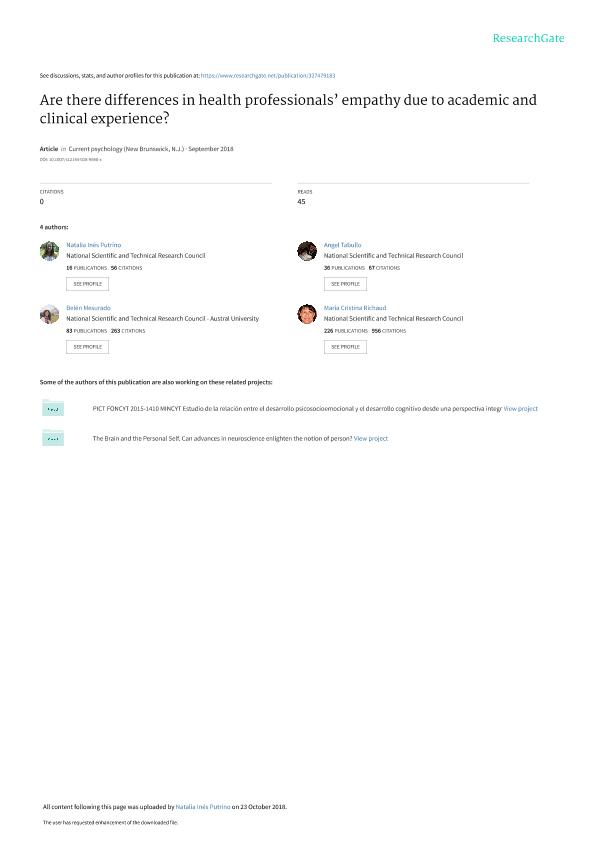Mostrar el registro sencillo del ítem
dc.contributor.author
Putrino, Natalia Inés

dc.contributor.author
Tabullo, Angel Javier

dc.contributor.author
Mesurado, Maria Belen

dc.contributor.author
Richaud, Maria Cristina

dc.date.available
2020-01-03T20:58:16Z
dc.date.issued
2018-09-06
dc.identifier.citation
Putrino, Natalia Inés; Tabullo, Angel Javier; Mesurado, Maria Belen; Richaud, Maria Cristina; Are there differences in health professionals’ empathy due to academic and clinical experience?; Springer; Current Psychology; 6-9-2018; 1-8
dc.identifier.issn
1046-1310
dc.identifier.uri
http://hdl.handle.net/11336/93528
dc.description.abstract
The health professional’s empathy has a positive effect on treatment outcomes and the well-being of both patients and professionals. The aim of this research was to assess the empathy levels of first-year medical and psychology students and to compare these levels with those of trained psychologists and physicians. In addition, we also analysed the potential effects of years of professional practice and the average number of patients treated on the empathy of professionals. We evaluated cognitive and emotional empathy through the Interpersonal Reactive Index and the Reading the Mind in the Eyes Task. The results showed that perspective taking in medical students was lower than that of psychotherapists, and psychotherapists and physicians reported lower levels of personal distress than psychology students. We did not find evidence of general detrimental effects of clinical experience on the capacity to feel sympathy and compassion towards others, but we did find lower empathic concern levels in those professionals with higher workloads. Considering that these effects have been seldom studied among psychologists, additional longitudinal research might indicate how empathy is influenced by training over time. On the other hand, since emotional distress can be detrimental to the professional’s performance, our results suggest that empathy needs to be promoted and trained, in order to preserve the ability to feel with others without falling into an extreme of emotional distress.
dc.format
application/pdf
dc.language.iso
eng
dc.publisher
Springer

dc.rights
info:eu-repo/semantics/openAccess
dc.rights.uri
https://creativecommons.org/licenses/by-nc-sa/2.5/ar/
dc.subject
EMPATHY
dc.subject
EXPERIENCE
dc.subject
PHYSICIANS
dc.subject
PSYCHOLOGISTS
dc.subject
STUDENTS
dc.subject.classification
Psicología

dc.subject.classification
Psicología

dc.subject.classification
CIENCIAS SOCIALES

dc.title
Are there differences in health professionals’ empathy due to academic and clinical experience?
dc.type
info:eu-repo/semantics/article
dc.type
info:ar-repo/semantics/artículo
dc.type
info:eu-repo/semantics/publishedVersion
dc.date.updated
2019-10-22T13:39:31Z
dc.identifier.eissn
1936-4733
dc.journal.pagination
1-8
dc.journal.pais
Estados Unidos

dc.journal.ciudad
Nueva York
dc.description.fil
Fil: Putrino, Natalia. Consejo Nacional de Investigaciones Científicas y Técnicas; Argentina. Universidad Abierta Interamericana; Argentina
dc.description.fil
Fil: Tabullo, Angel Javier. Consejo Nacional de Investigaciones Científicas y Técnicas; Argentina. Pontificia Universidad Católica Argentina "Santa María de los Buenos Aires"; Argentina
dc.description.fil
Fil: Mesurado, Belén. Consejo Nacional de Investigaciones Científicas y Técnicas; Argentina
dc.description.fil
Fil: de Minzi, María Cristina Richaud. Consejo Nacional de Investigaciones Científicas y Técnicas; Argentina
dc.journal.title
Current Psychology
dc.relation.alternativeid
info:eu-repo/semantics/altIdentifier/doi/http://dx.doi.org/10.1007/s12144-018-9980-x
dc.relation.alternativeid
info:eu-repo/semantics/altIdentifier/url/https://link.springer.com/article/10.1007%2Fs12144-018-9980-x
Archivos asociados
